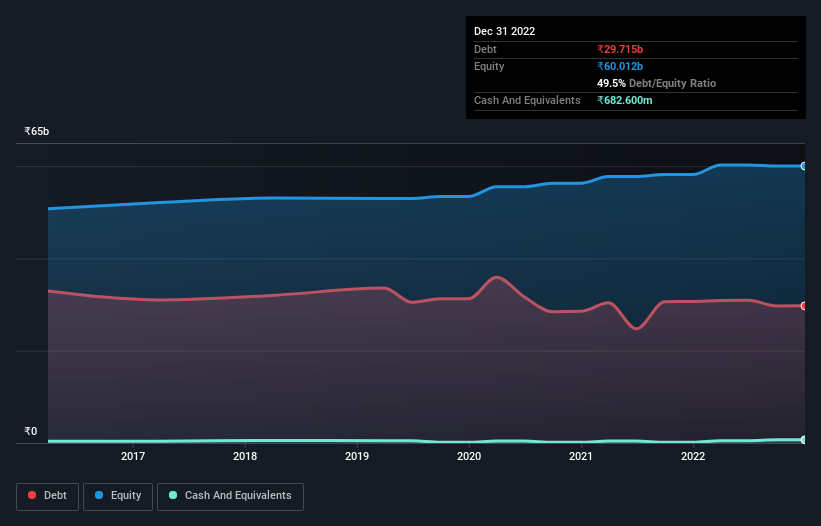
Warren Buffett famously said, 'Volatility is far from synonymous with risk.' So it seems the smart money knows that debt - which is usually involved in bankruptcies - is a very important factor, when you assess how risky a company is. Importantly, The India Cements Limited (NSE:INDIACEM) does carry debt. But is this debt a concern to shareholders?
Why Does Debt Bring Risk?
Debt is a tool to help businesses grow, but if a business is incapable of paying off its lenders, then it exists at their mercy. If things get really bad, the lenders can take control of the business. While that is not too common, we often do see indebted companies permanently diluting shareholders because lenders force them to raise capital at a distressed price. Of course, debt can be an important tool in businesses, particularly capital heavy businesses. The first step when considering a company's debt levels is to consider its cash and debt together.
See our latest analysis for India Cements
What Is India Cements's Net Debt?
As you can see below, India Cements had ₹29.7b of debt, at September 2022, which is about the same as the year before. You can click the chart for greater detail. On the flip side, it has ₹682.6m in cash leading to net debt of about ₹29.0b.

A Look At India Cements' Liabilities
According to the last reported balance sheet, India Cements had liabilities of ₹29.9b due within 12 months, and liabilities of ₹31.1b due beyond 12 months. Offsetting this, it had ₹682.6m in cash and ₹11.3b in receivables that were due within 12 months. So it has liabilities totalling ₹49.0b more than its cash and near-term receivables, combined.
This deficit is considerable relative to its market capitalization of ₹57.3b, so it does suggest shareholders should keep an eye on India Cements' use of debt. Should its lenders demand that it shore up the balance sheet, shareholders would likely face severe dilution. There's no doubt that we learn most about debt from the balance sheet. But it is future earnings, more than anything, that will determine India Cements's ability to maintain a healthy balance sheet going forward. So if you're focused on the future you can check out this free report showing analyst profit forecasts.
Over 12 months, India Cements reported revenue of ₹55b, which is a gain of 13%, although it did not report any earnings before interest and tax. We usually like to see faster growth from unprofitable companies, but each to their own.
Caveat Emptor
Importantly, India Cements had an earnings before interest and tax (EBIT) loss over the last year. To be specific the EBIT loss came in at ₹2.5b. When we look at that and recall the liabilities on its balance sheet, relative to cash, it seems unwise to us for the company to have any debt. Quite frankly we think the balance sheet is far from match-fit, although it could be improved with time. On the bright side, we note that trailing twelve month EBIT is worse than the free cash flow of ₹3.3b and the profit of ₹894m. So if we focus on those metrics there seems to be a chance the company will manage its debt without much trouble. There's no doubt that we learn most about debt from the balance sheet. But ultimately, every company can contain risks that exist outside of the balance sheet. For example, we've discovered 4 warning signs for India Cements (1 is potentially serious!) that you should be aware of before investing here.
If, after all that, you're more interested in a fast growing company with a rock-solid balance sheet, then check out our list of net cash growth stocks without delay.
New: AI Stock Screener & Alerts
Our new AI Stock Screener scans the market every day to uncover opportunities.
• Dividend Powerhouses (3%+ Yield)
• Undervalued Small Caps with Insider Buying
• High growth Tech and AI Companies
Or build your own from over 50 metrics.
Have feedback on this article? Concerned about the content? Get in touch with us directly. Alternatively, email editorial-team (at) simplywallst.com.
This article by Simply Wall St is general in nature. We provide commentary based on historical data and analyst forecasts only using an unbiased methodology and our articles are not intended to be financial advice. It does not constitute a recommendation to buy or sell any stock, and does not take account of your objectives, or your financial situation. We aim to bring you long-term focused analysis driven by fundamental data. Note that our analysis may not factor in the latest price-sensitive company announcements or qualitative material. Simply Wall St has no position in any stocks mentioned.
About NSEI:INDIACEM
India Cements
Produces and sells cement and cement related products in India.
Reasonable growth potential with mediocre balance sheet.
Similar Companies
Market Insights
Community Narratives



